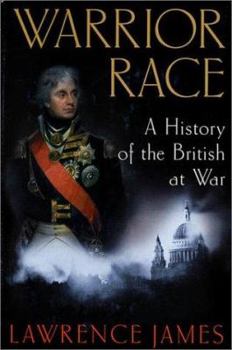Warrior Race: A History of the British at War
Select Format
Select Condition 
Book Overview
Modern Britain is a nation shaped by wars. The boundaries of its separate parts are the outcome of conquest and resistance. The essence of its identity are the warrior heroes, both real and imagined,... This description may be from another edition of this product.
Format:Hardcover
Language:English
ISBN:0312307373
ISBN13:9780312307370
Release Date:February 2003
Publisher:St. Martin's Press
Length:864 Pages
Weight:2.45 lbs.
Dimensions:2.3" x 6.4" x 9.5"
Customer Reviews
2 ratings
A Nation of Shopkeepers, Not Warriors
Published by Thriftbooks.com User , 15 years ago
Napoleon's sarcasm is somewhat unfair but essentially true. James's impressive wealth of documented detail is unconvincing in arguing that the British character marks them as a "martial race" like the Gurkhas, which the other review notes. (Even Gurkhas do not fit the stereotype; cf. T. Parsons, "The African Rank-and-File" for a persuasive critique of martial-race ideology.) "WR" is not a narrative, instead it skips between incidents in the wars and rebellions covered chronologically. It is thoughtful and stimulating as an extended commentary on British war experiences. But the Napoleonic insight still rears its head, because James does not fully consider evidence that counters his thesis. The real British genius is pragmatism, historically enabling success in many endeavors, with warfare merely one among many, and less crucial than labor or commerce. Dynastic marriage, a notable art of peace, was at least as important in creating the United Kingdom. This was less true for the Empire, but many colonies were added through peaceful negotiations and trade relations. James highlights the upper classes' warlike virtues, but the first review injects more nuanced class analysis in identifying workers' core interest in peace; they are most of the victims, after all. Cf. Jez Lowe's song, "Old Bones," a moving example of proletarian antiwar feeling. "WR" is an exciting ride through history, but you'll end somewhere besides the author's intended destination.
Brilliant history of empire and war
Published by Thriftbooks.com User , 21 years ago
Lawrence James, the distinguished independent historian of the British Empire, has written a fascinating account of Britain's wars and their impact on British culture. It is based on huge research in private papers and secondary sources. It is in six parts: conquests 43-1100, disputed lands 1110-1603, civil wars 1637-1800, overseas wars 1660-1870, total war 1914-1919, and the people's wars 1919-2000. He constantly notes the forces' pay and conditions, and tells us how the fighting and killing must have felt.Part I depicts the conquests by Romans, Vikings and Danes. Part II tells of the wars against Ireland, Wales and Scotland that determined Britain's shape. The hundred years' war against France (1337-1453) started with the early victory of Crecy, then slowly collapsed into military debacles abroad and spiralling debt and taxes at home. At this time, chivalric tales glamorised war, setting up the lasting themes of crusade and sacrifice, `Church and King', `king and country', and `natural leaders' (public school prefect types) `rallying the ranks'.In Part III, James includes under `civil wars' the American War of Independence and Ireland's 1798 rebellion, which were really national liberation wars against colonial oppression. In Part IV, he tells us about the vast wars for empire: the second hundred years' war against France (1688-1815), the wars to seize and control India (1757-1858) and its North West frontier (1897-1924), the 64 years war to control China (1840-1904) and the South African (1879-1902) and North African wars (1882-1898). These cast some doubt on the slogan `Pax Britannica'.Part V looks at World War One, where James damns Earl Haig's reliance on attrition and `fighting spirit'. Part VI examines World War Two and the many bloody retreats from Empire. To finish he asks, `What next?', answering `further wars of intervention' and `the wonders of the electronic battlefield'. This brilliantly written and deeply researched account proves, possibly against the author's intentions, that capitalism means empire and empire means war. The ruling class alone gains from capitalism, empire and war. Our working class is not a warrior race, a nation of Ghurkhas; we are for industry and peace.





